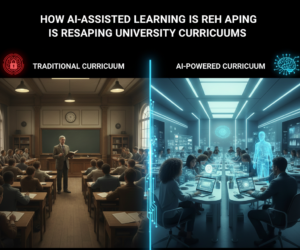How to Pick an Appropriate Higher Education Research Topic

How to Pick an Appropriate Higher Education Research Topic
One of the most crucial academic choices you will make is selecting the appropriate study topic for your capstone project, dissertation, or thesis in higher education. It’s important to match your passion, academic objectives, and future job path with a subject that is both manageable and significant. It’s not simply about choosing something intriguing.
Let’s look at a methodical approach to help you identify a research topic that motivates you, wows your teachers, and advances your field of study.
Why Selecting the Correct Subject Is Important
The framework for months or even years of research is established by your research topic. It influences how peers, instructors, and potential employers perceive your intellectual prowess. The research process can be frustrating if the topic is badly chosen, but it can also lead to deeper understanding, academic recognition, or even practical influence if it is chosen well.
It is therefore worthwhile to take your time and make thoughtful decisions.
1. Recognize your areas of passion and interest
Thinking about what interests you is the first and most crucial step. Which subjects in your field pique your interest? Do you have an issue that you find bothersome, a trend that you find fascinating, or a question that you can’t seem to get out of your head?
Selecting a topic that truly interests you will:
- keep you inspired during the challenging phases of your research.
- encourage you to have pleasure in the writing, research, and presentation processes.
- Make your employment feel less like a chore and more like a purpose.
- Even if it weren’t for a grade, would I still want to learn more about this subject?
2. Examine previous projects and course materials.
The best ideas are sometimes there in front of you. Examine your previous assignments, course notes, and textbooks. Was there a case study or subject that caught your attention? Did any lecture or paper pique your interest?
You can benefit from these resources:
- Identify knowledge gaps that merit investigation.
- Go over theories you want to test again in a different setting.
- Expand upon what you already know well.
- You don’t have to start from scratch; it’s wise to build on existing foundations.
3. Determine Current Concerns in Your Industry
The main goals of research are value addition and problem solving. Examine the current controversies or trends in your field of study. This will guarantee that your subject is current, pertinent, and possibly influential.
Ways to investigate contemporary issues:
- Read recent papers and scholarly journals.
- Keep up with trade journals or news.
- Look into local new policies, research funds, or conference themes.
- Both academic and non-academic audiences will find your research more appealing if you select a contemporary, real-world problem.
4. Examine the feasibility and scope.
Even if a topic is intriguing, is it doable?
Prior to deciding on a subject, consider:
- Is there adequate literature or data available?
- Do I have the appropriate resources, participants, or instruments at my disposal?
- Will I be able to finish it in the allotted time?
- Steer clear of subjects that are either too general (like “Climate Change”) or too specific (like “The Effect of Climate Change on One Leaf in One Forest”). Strive for equilibrium: broad enough to allow for exploration, yet specialized enough to have meaning.
5. Consider Your Professional Objectives
Your research project might serve as a springboard for your future. Select a topic that aligns with your goals if you intend to pursue a particular career or academic field.
For instance:
- A research paper on social justice or governance makes sense if you’re going into public policy.
- Investigate a practical use case or algorithmic issue if you plan to pursue a career in AI or data science.
- You can develop your knowledge, write a compelling sample for your graduate school or job application, and even expand your network with a topic that is well-aligned.
6. Speak with peers, mentors, or professors
Share the process with others. A brief discussion with a more seasoned person can occasionally help you develop or polish your idea. Professors are aware of what constitutes a compelling topic and what kind of ideas may be fruitless.
They can assist you:
- Consider your research question.
- Make recommendations for reading lists or frameworks.
- Bring up possible issues or moral dilemmas.
- Speaking with classmates or joining a study group might also help you see things from different angles or generate ideas you hadn’t thought about.
7. Establish a Specific Research Question
After you have a broad topic, focus on it by formulating a precise research question. Your entire research should be guided by this question, which will also dictate the type of data you will gather and the method of analysis.
The following is a compelling research question:
- clear and focused.
- unable to be answered with a straightforward “yes” or “no.”
- researchable with the tools and techniques at hand.
- For instance:
- “How does social media affect students?” is a vague question.
Stronger: “What is the effect on university students’ mental health of using Instagram for academic support?”
8. Verify that it is unique or presents a novel viewpoint.
While it’s not necessary to start from scratch, you should refrain from replicating previous studies without including your own unique perspective. Seek out a novel perspective, a new demographic, an alternative approach, or a novel setting.
A few pointers:
- Combine two pre-existing subjects (e.g., education + AI).
- Apply an outdated idea to a novel situation.
- Make use of recent events or updated data.
- Being original just means adding something fresh to the current discussion; it does not imply radicalism.
9. Use a brief outline or research to test your idea.
Try creating a brief synopsis or outline before deciding on your topic. This aids in testing:
- How well you comprehend the subject.
- if your query is reasonable.
- if there is sufficient data or literature already in existence.
- It may not be the proper fit or may require improvement if it’s too hard to even begin structuring your ideas.
10. Remain Adaptable and Receptive to Change
You may occasionally discover that the topic needs to be changed even after you have begun your study. That is quite typical. If necessary, be willing to change your inquiry, your perspective, or your focus.
The process of research is one of discovery. Don’t only follow your first notion; let the facts, readings, and feedback help you decide on your final course.
Your Subject, Your Voice
Selecting the ideal study topic is more than simply an academic task; it’s a chance to express yourself, follow your interests, and delve into something significant. Don’t be scared to follow your curiosity, ask questions, or make mistakes. A straightforward inquiry and a glimmer of interest are frequently the beginning of the best study.




